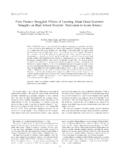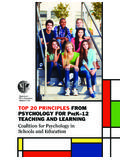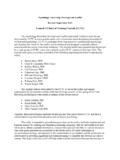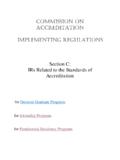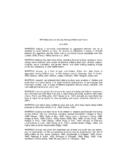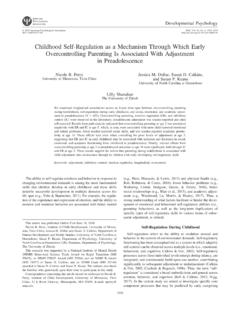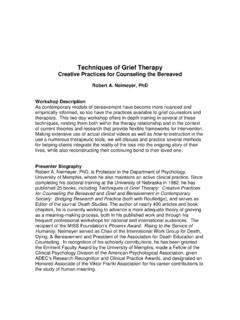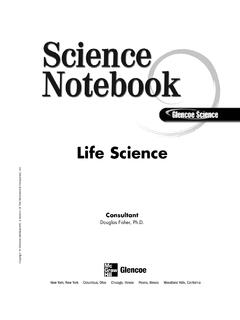Transcription of PERSPECTIVES IN PSYCHOLOGICAL SCIENCE
1 BACK TO CONTENTSK enneth D. Keith, PhD University of San DiegoAdapted and expanded from previous work by Fred Connington, Randal M. Ernst, Nancy Fenton, Steve Jones, and Jeff NorbyDeveloped and produced by the Teachers of Psychology in Secondary Schools (TOPSS) of the American PSYCHOLOGICAL Association, July IN PSYCHOLOGICAL SCIENCEA Three-Day Unit Lesson Plan for High School Psychology TeachersiiPERSPECTiVES iN PSYCHOLOGiAL SCiENCEPERSPECTIVES IN PSYCHOLOGICAL SCIENCE A Three-Day Unit Lesson Plan for High School Psychology TeachersThis unit is aligned to the following content and performance standards of the National Standards for High School Psychology Curricula (APA, 2011):DOMAiN: SCiENTiFiC iNQUiRYSTANDARD AREA.
2 PERSPECTIVES iN PSYCHOLOGICAL SCiENCECONTENT STANDARDS After concluding this unit, students understand: 1. Development of psychology as an empirical SCIENCE 2. Major subfields within psychologyCONTENT STANDARDS WiTH PERFORMANCE STANDARDSCONTENT STANDARD 1: Development of psychology as an empirical scienceStudents are able to: Define psychology as a discipline and identify its goals as a SCIENCE Describe the emergence of psychology as a scientific discipline Describe PERSPECTIVES employed to understand behavior and mental processes Explain how psychology evolved as a scientific disciplineCONTENT STANDARD 2: Major subfields within psychologyStudents are able to: Discuss the value of both basic and applied PSYCHOLOGICAL research with human and nonhuman animals Describe the major subfields of psychology Identify the important role psychology plays in benefiting society and improving people s livesAn earlier draft of this lesson plan had been supported by a grant from the American PSYCHOLOGICAL Foundation.
3 TOPSS thanks John Norcross, PhD, of the University of Scranton and Jyh-Hann Chang, PhD, of East Strouds-burg University for their reviews of this unit (C) 2014 American PSYCHOLOGICAL Association. iiiA THREE-DAY UNiT LESSON PLAN FOR HiGH SCHOOL PSYCHOLOGY TEACHERS iNTRODUCTiON V PROCEDURAL TiMELiNE 1 CONTENT OUTLiNE 3 ACTiViTiES 21 CRiTiCAL THiNKiNG AND DiSCUSSiON QUESTiONS 39 RESOURCES, REFERENCES, AND 41 RECOMMENDED READiNG APPENDiX.
4 ADDiTiONAL KEY HiSTORiCAL FiGURES 47 FOR UNiT LESSON PLAN CONTENTSVA THREE-DAY UNiT LESSON PLAN FOR HiGH SCHOOL PSYCHOLOGY TEACHERSBACK TO CONTENTSS tudents come to their first psychology course with a variety of as-sumptions and expectations, many of them based on misconceptions and misunderstanding. Thus, students may not be aware of the distinc-tions between psychology and psychiatry, or they may assume that all of PSYCHOLOGICAL SCIENCE is devoted to treatment and care of people with personal problems. In this unit you will introduce students to a broader view of the field, encompassing not only the practices they may expect to learn, but also the wide array of additional applications in industry, biol-ogy, medicine, and more.
5 Furthermore, you will acquaint students with the scientific foundations of psychology and psychologists interest in the behavior of both human and nonhuman psychologist Hermann Ebbinghaus (1908) famously observed that psychology has a long past, yet its real history is short (p. 1). As long as there have been people, they have been interested in the nature and causes of behavior, and for centuries philosophers and scientists have studied behavior; yet psychology as a distinct discipline came into existence only within the past 150 years. The story of PSYCHOLOGICAL per-spectives is the story of the evolution of PSYCHOLOGICAL SCIENCE from its roots in philosophy and biology to the variety of viewpoints and specialties that we recognize today.
6 Although the National Standards for High School Psychology Curricula does not explicitly mention history of psychology, some knowledge of the history of the field is necessary for an understanding of the emergence of psychology as a scientific discipline. This history includes the backdrop provided by the early Greek philosophers and physicians, moves through the Middle Ages to the Renaissance era, gathers momentum during the Age of Enlightenment, and brings forth the SCIENCE of psychology in the laboratories of late 19th-century Europe and North America. The history of PSYCHOLOGICAL SCIENCE culminates in the diverse subfields that character-ize the work of contemporary psychologists, both researchers and iN PSYCHOLOGiAL SCiENCEBACK TO CONTENTSSome teachers of psychology prefer to teach the history and evolution of the field through the lives and work of the key figures who shaped the field.
7 Others adopt an approach based on the cultural backdrop or spirit of the times (the zeitgeist) as a determinant of PSYCHOLOGICAL viewpoints. Perhaps the most effective strategy lies in the recognition that powerful people are both the product of their times and the shapers of their times suggesting an ongoing reciprocal process that leads naturally to changing points of view and an evolving SCIENCE that continues to reflect the people and plac-es from which it , PSYCHOLOGICAL PERSPECTIVES are likely to seem more sensible and understandable to students who know something about the lives of the people who have shaped those PERSPECTIVES . And the people are more likely to come alive in the minds of students who can appreciate the pol-itics, religion, and scientific knowledge of the times in which those scien-tists and theorists existed.
8 This unit contains three suggested lessons: Evolution of PSYCHOLOGICAL SCIENCE , PSYCHOLOGICAL PERSPECTIVES , and Subfields of PSYCHOLOGICAL Sci-ence and Practice. In addition, this unit contains a section with brief notes on additional key people; a section with suggested teaching activities; and a section with resources, references, and suggested readings. Although the material is organized into three suggested lessons, you could certainly spend more time on the PERSPECTIVES and history of the field, especially if you make use of some of the more extensive ideas for THREE-DAY UNiT LESSON PLAN FOR HiGH SCHOOL PSYCHOLOGY TEACHERSBACK TO CONTENTSPROCEDURAL TIMELINELESSON 1: EVOLUTION OF PSYCHOLOGICAL SCIENCEA ctivity : Activities From the Society for the History of Psychology WebsiteActivity : Facebook ActivityActivity : Psychology Goes to Madison AvenueLESSON 2: PSYCHOLOGICAL PERSPECTIVESA ctivity 2: Using PSYCHOLOGICAL PERSPECTIVES to Answer Questions on BehaviorLESSON 3.
9 SUBFIELDS OF PSYCHOLOGICAL SCIENCE AND PRACTICEPROCEDURAL TIMELINEPROCEDURAL TIMELINE3A THREE-DAY UNiT LESSON PLAN FOR HiGH SCHOOL PSYCHOLOGY TEACHERSBACK TO CONTENTSLESSON 1 Evolution of PSYCHOLOGICAL ScienceIn this lesson you will trace the development of ideas about behavior from the early Greek philosophers to contemporary scientists. I. Defining PSYCHOLOGICAL SCIENCE A. Scholars interested in philosophy, physiology, and psychology have long studied subject matters that today we might consider PSYCHOLOGICAL SCIENCE : mind, thought, consciousness, learning, memory, and behavior, among others. B. These various interests have encompassed not only the observ-able outward activities that we call behavior, but a wide range of in-ternal events that we now consider mental processes.
10 Thus, today we define psychology as the SCIENCE of behavior and mental Under the umbrella of this definition, psychologists have two major goals: 1. PSYCHOLOGICAL scientists conduct research to create and disseminate knowledge in broad areas of behavior, both human and nonhuman. Scientists conduct basic research in order to improve understanding of behavioral and mental pro-cesses in their own Psychologists work to improve the lives of people by apply-ing the findings of PSYCHOLOGICAL SCIENCE to a wide range of real-world problems and settings. These include diagnosis CONTENT OUTLINECONTENT OUTLINE4 PERSPECTIVES iN PSYCHOLOGiAL SCiENCEBACK TO CONTENTSand treatment of mental illness, vocational and educational counseling, improvement of physical health, development of social policy, applications to law, and increased effectiveness of management, among many Thus, the aims of PSYCHOLOGICAL SCIENCE as a discipline reflect the goals listed above: PSYCHOLOGICAL SCIENCE contributes to the scientific understanding of behavior and mental processes by describing, explaining, and predicting behavior through the scientific method.
